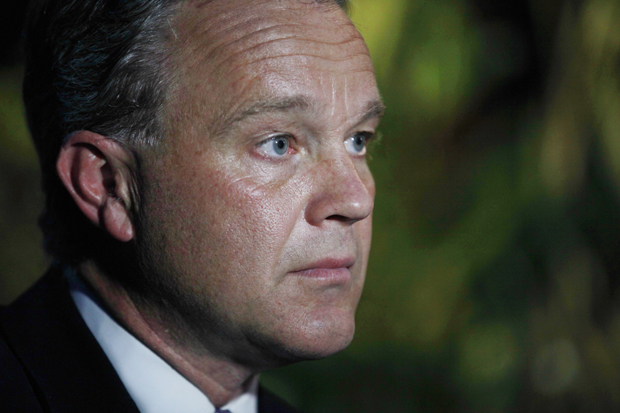I feel some sympathy for Mark Simmonds, the Conservative MP who’s resigned as a minister and is stepping down at the end of this Parliament because he can’t support his family. His announcement has been greeted with scorn and derision by the chattering classes — how dare he complain that an MP’s salary isn’t enough to live on? — even though most of them are earning far more than him. Any politician who utters a murmur of dissent about the terms and conditions of his or her employment is an instant pariah.
In fact, if you can be bothered to read beyond the headlines, Simmonds’s complaint seems pretty reasonable. His constituency is in Lincolnshire and under the new expenses regime he isn’t entitled to claim for the cost of renting a flat in London large enough to accommodate his family, just a hotel room. If he had a flat, his wife and three children could spend the weekdays with him and the weekends in his constituency, but as things stand he is forced to spend four nights a week sleeping alone in some seedy Westminster hotel. ‘Any parent would hate that — and I do,’ he said.
He was earning £89,435 as a Foreign Office minister and that’s nothing to sniff at. The trouble is, it’s not enough to put his family up in London during the week as well as maintaining a home in his constituency. It’s also worth noting that his ministerial salary represents the most he’s earned as an MP. Until he joined the government in 2012, he was on a backbencher’s wages and had been for over ten years. Before becoming an MP in 2001 he was a director of a successful property business and it’s a safe bet that if he’d spent the past 13 years in the commercial sector he’d be a multi-millionaire by now. Is it really so outrageous of him to conclude that serving three parliamentary terms is enough?
If Simmonds is guilty of anything, it’s being too honest about his reasons for quitting. The end of this Parliament will see an unprecedented number of members standing down — current estimates are 11 per cent of Conservative MPs and 15 per cent of Labour MPs — and I imagine Simmonds is expressing what many of them think but fear to say. The price they’re being asked to pay for their public service is simply too high.
I’ve spoken to many MPs about this and my sense is they’d be prepared to endure these privations — long hours, lots of grunt work, estrangement from their families — if they enjoyed a higher standing in their communities. The reason they’re leaving in droves isn’t because the new rules on expenses make it harder for them to get by, although it does. It’s more the lack of respect signalled by the new regime. It’s one thing to make these sacrifices if the public regard you as a dedicated public servant, quite another if they think you’re no better than a career criminal, either on the fiddle or shagging your secretary. When MPs are driving back and forth to their constituencies, listening to the constant abuse being meted out to politicians by tax–dodging satirists on Radio 4, they must think, ‘What’s the point?’
When I argue about this with my friend Paul Staines (him of Guido Fawkes fame), he says it’s right that MPs should be held in contempt by the public. Much better for them to be mistrusted and subject to constant scrutiny, because it means they’re less likely to misbehave. You only have to look at France if you want to see the terrible price Britain would pay if the political class commanded more respect. Corruption on a scale that would make Lloyd George blush.
No doubt there’s something in this, but the downside is that if we continue to hold politicians in such low regard it will make it harder to attract good people to the Commons. MPs on both sides of the House will be limited to the very rich and the very ambitious, ideally with no family ties. Someone could be all of those things and still a good leader, but as a general rule the Commons needs more people the public can identify with, not fewer.
Walter Bagehot said the ideal MP was an ordinary man of extraordinary ability. The danger of losing people like Mark Simmonds, who fits that description pretty well, is that we’ll end up with a House of Commons composed of extraordinary men of ordinary abilities.
Got something to add? Join the discussion and comment below.
Get 10 issues for just $10
Subscribe to The Spectator Australia today for the next 10 magazine issues, plus full online access, for just $10.
Toby Young is associate editor of The Spectator.
You might disagree with half of it, but you’ll enjoy reading all of it. Try your first month for free, then just $2 a week for the remainder of your first year.















Comments
Don't miss out
Join the conversation with other Spectator Australia readers. Subscribe to leave a comment.
SUBSCRIBEAlready a subscriber? Log in